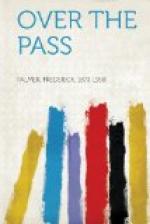The spirit of his farewell message to Jack, which said that strength might return but bade weakness to remain away, and the injured pride of seeing a presentment of wounded egoism in the features of a sickly boy, which had kept him from going to Arizona, were again dominant. Yet that morning he had a pressing sense of distraction. Even Mortimer noticed it as something unusual and amazing. He kept reverting to Jack’s history between flashes of apprehension and he was angry with himself over his inability to concentrate his mind. Concentration was his god. He could turn from lace-buyer to floor-walker with the quickness of the swing of an electric switch. Concentrate and he was oblivious to everything but the subject in hand. He was in one of the moments of apprehension, half staring at the buttons on the desk rather than at the papers, when he heard the door open without warning and looked up to see a lean, sturdy height filling the doorway and the light from the window full on a bronzed and serene face.
More than ever was Jack like David come over the hills in his incarnation of sleeping energy. Instead of a sling he carried the rose. Into the abode of the nicely governed rules of longevity came the atmosphere of some invasive spirit that would make the stake of life the foam on the crest of a charge in a splendid moment; the spirit of Senor Don’t Care pausing inquiringly, almost apologetically, as some soldier in dusty khaki might if he had marched into a study unawares.
Jack was waiting, waiting and smiling, for his father to speak. In a swift survey, his features transfixed at first with astonishment, then glowing with pride, the father half rose from his chair, as if in an impulse to embrace the prodigal. But he paused. He felt that something under his control was getting out of his control. He felt that he had been tricked. The boy must have been well for a long time. Yes! But he was well! That was the vital point. He was well, and magnificent in his vigor.
The father made another movement; and still Jack was waiting, inquiring yet not advancing. And John Wingfield, Sr. wished that he had gone to the station; he wished that he had paid a visit to Arizona. This thought working in his mind supplied Jack’s attitude with an aspect which made the father hesitate and then drop back into his chair, confused and uncertain for the first time in his own office.
“Well, Jack, you—you surely do look cured!” he said awkwardly. “You see, I—I was a little surprised to see you at the office. I sent the limousine for you, thinking you would want to go straight to the house and wash off the dust of travel. Didn’t you connect?”
“Yes, thank you, father—and when you didn’t meet me—”
“I—I was very busy. I meant to, but something interrupted—I—” The father stopped, confounded by his own hesitation.
“Of course,” said Jack. He spoke deferentially, understandingly. “I know how busy you always are.”




